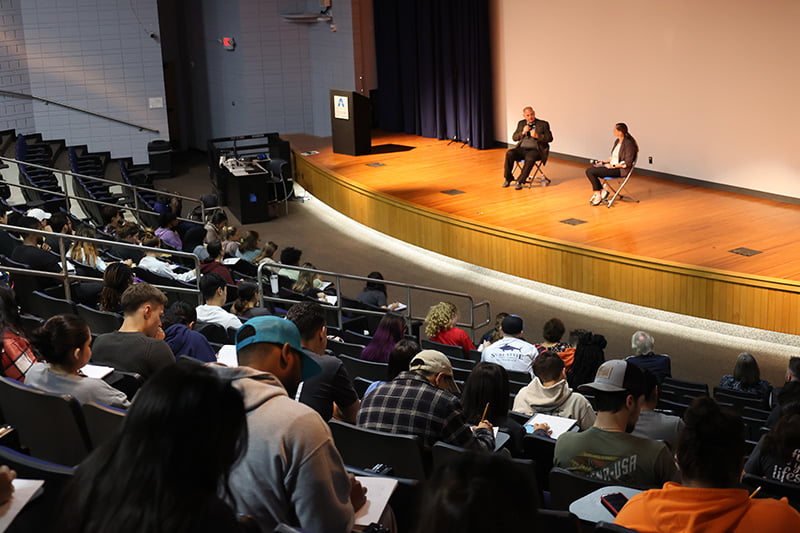411 S. Nedderman Drive
Box 19407, Arlington, Texas 76019-0407
P: 817-272-2776 | F: 817-272-5006
Paving the way for adaptive sports

Doug Garner, retired head coach of the UTA Movin’ Mavs, was invited to be the guest speaker at the Eugene Anderson Lecture Series for the Department of Kinesiology. Speakers in this series are those who have made significant contributions to sports. With his positive impact in adapted sports at UTA, nationally, and internationally, Garner has paved the way for opportunities for disabled athletes.
Garner’s journey to becoming the head coach of the Movin’ Mavs was fueled by passion and drive to make a change for people with disabilities.
“I began my journey into adapted sports when I started a junior adapted sports program in Arkansas,” said Garner. “My son had been born with a disability and there was nothing in the state for him to participate in. This was in the late 1980s and early 1990s right when the Americans with Disabilities Act passed highlighting the need for opportunities for people with disabilities and the realities of our culture. Something needed to be done to address these needs.”
 As a coach for adaptive athletes, Garner found that community support was the key to recognizing diversity, equity and inclusion for people with disabilities. He knew that he would have to target people and resources in the community and state, who believed everyone deserves the opportunity to be involved in sports participation. Sports and activity opportunities lead to more awareness of individual differences and acceptance of diversity in our world.
As a coach for adaptive athletes, Garner found that community support was the key to recognizing diversity, equity and inclusion for people with disabilities. He knew that he would have to target people and resources in the community and state, who believed everyone deserves the opportunity to be involved in sports participation. Sports and activity opportunities lead to more awareness of individual differences and acceptance of diversity in our world.
Having the stage as an Intercollegiate Wheelchair Basketball Coach allowed Garner to not only help individuals use sports as a vehicle to education, future success and socioeconomic intergenerational mobility, but also help educate others on why it is important to provide these programs to the population of people with disabilities.
“UTA needs to continue growing sports programs for people with disabilities and fund all adapted sports programs to make sure that all athletes at UTA have equal opportunities for success,” said Garner. “UTA offers multiple intercollegiate opportunities for our students, yet only one sport for our student-athletes with disabilities. I was able to work with Dr. Lamas to start a women's wheelchair basketball team in 2014 that went on to win two national championships. Our adapted athletes are not part of the Intercollegiate Athletics Fee that all students pay, which makes the growth and success of the Movin' Mavs difficult to sustain as Intercollegiate Athletics.”
To those wishing to have a career in adaptive sports, Garner says everyone must have the vision that all students deserve an opportunity for inclusion. Being a coach for an adaptive sport requires a person to be well-rounded in all subject matter fields such as strength and conditioning, nutrition, academic tutors and mental skills training. As well as skills in education, technology, marketing and social media. One must be prepared to be the entire athletic department for disabled athletes.
“I hope my legacy becomes the future success and happiness of our student-athletes and at least a small part of the world that recognizes the abilities of people with disabilities,” said Garner. “Change is slow, but our world is changing, and I hope that I contributed to these changes and expectations on our campus.”
- Written by Midori Hrinda, UTA College of Nursing and Health Innovation